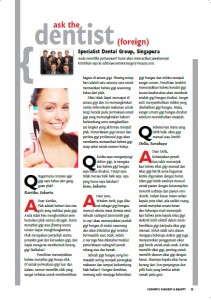 Here are a few questions that we received from Cosmetic Surgery & Beauty Magazine – Indonesia‘s readers.
Here are a few questions that we received from Cosmetic Surgery & Beauty Magazine – Indonesia‘s readers.
Q. How Do You Stop Plaque Attacks?
Answer: Plaque is a sticky film of bacteria and sugars that constantly form on our teeth. You cannot stop plaque formation however you can prevent or minimize its accumulation and the damage it may cause. Bacteria is always in our mouths and they feed on carbohydrates in our diet and saliva to grow. Plaque accumulates quickly over a short period of time and going without brushing or flossing regularly to remove it can result in deterioration of one’s overall dental condition. Plaque is the main cause of gum disease and tooth decay, and can harden to form tartar (calculus) if not removed daily.
Many would assume that brushing alone is sufficient for achieving that bright sparkle, but this is insufficient. Research shows that brushing is only effective for the outer and inner teeth surfaces, but has very limited effect for cleaning in between teeth. Flossing daily in addition to toothbrushing is the only way to ensure that one’s teeth is free from plaque that leads to gingivitis and periodontal (gum) disease. Brushes are not able to reach in between individual teeth and this allows microscopic residues of food to remain on the surface of the enamel – allowing bacteria to feed on them and produce sticky substances that eventually become plaque.
Diligent daily flossing, combined with thorough brushing at least twice a day, is important for preventing plaque buildup. Regular dental checkups and professional teeth cleanings will also go a long way in helping to ensure that the teeth stay bright and healthy for a lifetime.
Q. When I visited my dentist for my last checkup, she told me that I have impacted wisdom teeth and she wants to remove them. They are not bothering me. Should I see a specialist if I decide to have them removed? What should I do?
Answer:
Wisdom teeth, also known as third molars, emerge during early adulthood. A panoramic dental radiograph (x-ray) will confirm the number of wisdom teeth in a person’s mouth and indicate whether any of these teeth are buried or unerupted. It also allows full radiographic examination of the upper and lower jaw architecture and all the teeth present.
An impacted tooth is a tooth that fully or partially buried under the gum line and is unable to erupt properly. Wisdom teeth are the most common type of impacted teeth requiring removal because they are growing at the wrong place and/or at a wrong angle. Seldom do they come out straight. The obstruction is caused either by the tooth in front of it or by the surrounding bone and gums.
Impacted wisdom teeth are frequently food traps and breeding grounds for bacteria. Thus, maintaining their cleanliness is difficult and infection is very common. Research lately has shown that overall dental condition improves after removal of wisdom teeth. Healing, after removal of infected wisdom teeth, is complicated. It is therefore common to remove wisdom teeth before they are symptomatic.
Read our previous blog post: When Losing your Wisdom Teeth is a wise thing to do
If you have dental related questions in mind, we would be happy to answer them. You can send them through our website online enquiry form, and we will get back to you within one working day.





